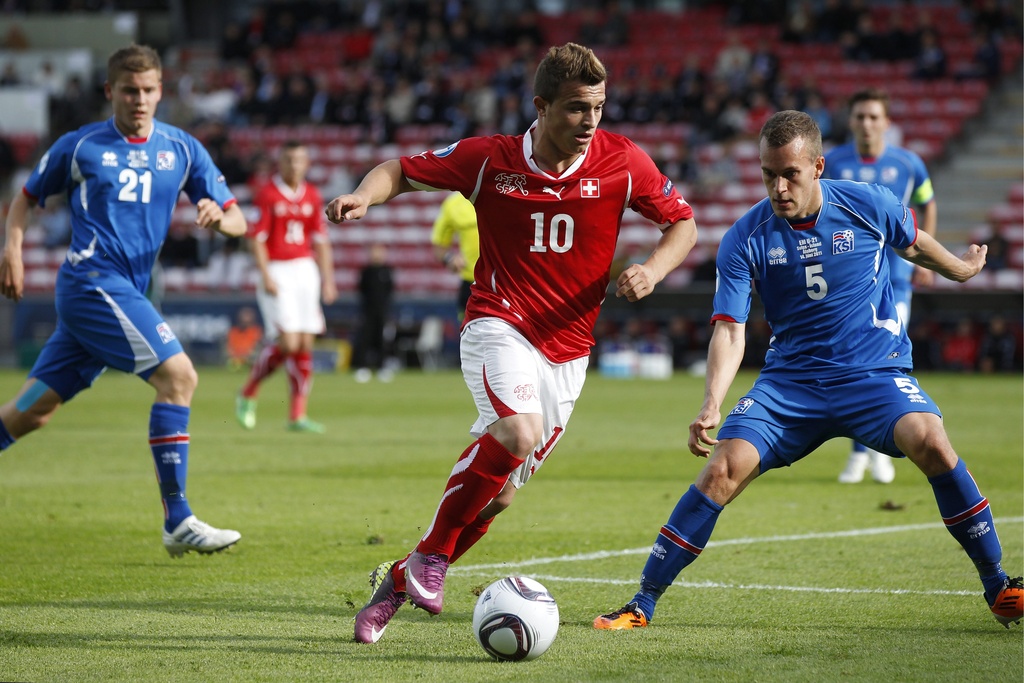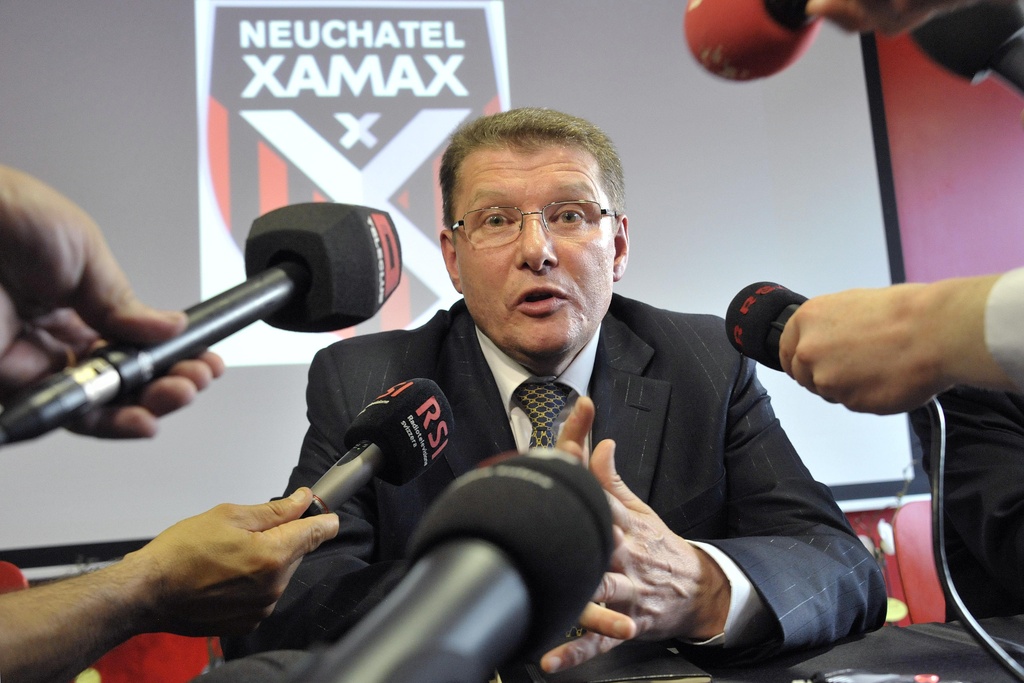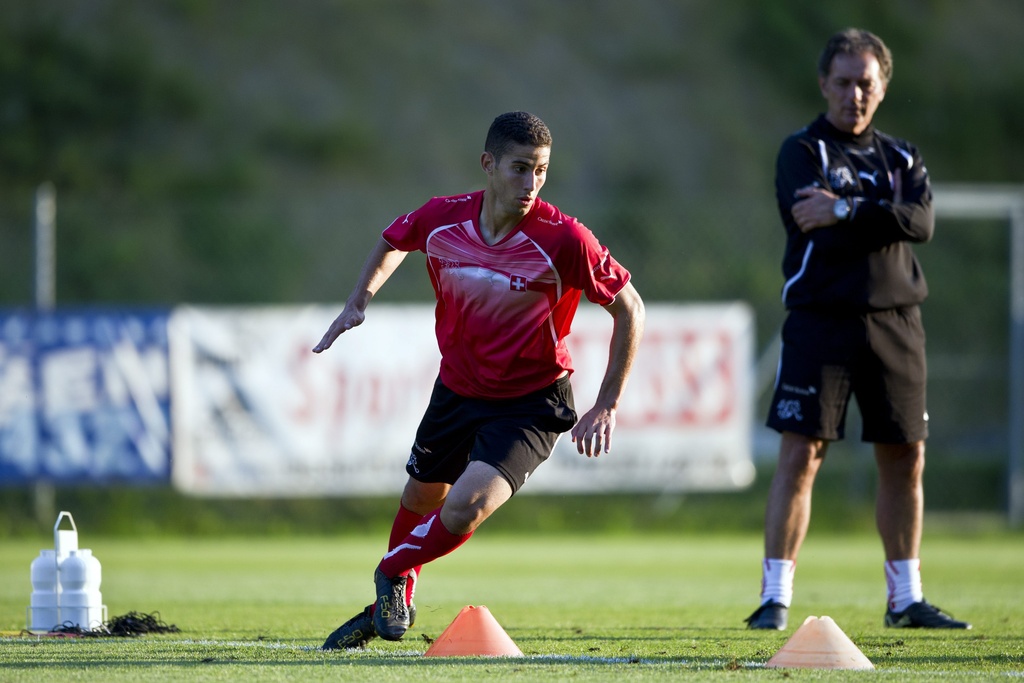Under-21s come within reach of European semis

Switzerland have the “talent and guts” to win the Uefa European Under-21 Football Championship, according to a former coach.
A renowned training regime and a multicultural advantage have put the team in a good position, according to Bernard Challandes, who coached the Under-21s from 2001-2007.
Switzerland virtually secured their place in the semifinals of the championship after defeating Iceland 2-0 on Tuesday. Although top of Group A, they still face Belarus on June 18.
Just two years ago the Swiss Under-17s won the World Cup in Nigeria. In the past two weeks, some of the key Under-21 players – Shaqiri, Xhaka and Emeghara – were picked by Swiss national coach Ottmar Hitzfeld for a 2012 group match against England.
All this is working in their favour, says Challandes, who took the Under-21s to third place in the European championship in 2002.
swissinfo.ch: How do you rate Switzerland’s record in the tournament so far in Denmark?
Bernard Challandes: I knew this team had great potential. They are meeting expectations, which doesn’t always happen. It reminds me of 2002 and 2004, when the Under-21s qualified for the final of the Euro. Then, we witnessed the arrival of Grichting, Magnin, Cabanas, Frei, Barnetta, Lichtsteiner, Degen. Today, the newcomers are Xhaka, Shaqiri, Emeghara, Mehmedi and Fabian Frei. There are high hopes for this new generation.
swissinfo.ch: Can Switzerland win the championship?
B.C.: Yes, this team can realise their dreams. They have the potential to qualify for the finals, where they could face Spain or England. It will not be easy, but I think it can happen.
swissinfo.ch: Switzerland are impressive in all areas of the game. What’s the secret of their success?
B.C.: It is no doubt a result of the training system developed in recent years. Many of the players move into Swiss clubs. And those who have gone abroad have all benefited from several years of training in Switzerland. We can be proud of the work done by the [Swiss Football] Association and the clubs. Our training system works perfectly and is now recognised worldwide.
swissinfo.ch: The new philosophy instilled in youth teams of an offensive, dynamic game, seems to have been picked up by Hitzfeld during the recent 2-2 match against England at Wembley.
B.C.: These young players bring a real freshness, as was the case with Frei, Barnetta and Cabanas a few years ago. With their talent, courage and guts, they are changing the face of the team. It’s a normal experience for any team. But in a country like Switzerland, it can sometimes be difficult to find successors. Once again we have a generation capable of successfully replacing those who are moving up. It’s remarkable.
swissinfo.ch: Why is there no major issue in Switzerland over the origin of these players, as is the case in France?
B.C.: In France, the debate has descended into racism. But it all started with thinking about the problem of players training in France and choosing another national team once they come of age.
We also had this discussion in Switzerland. It wasn’t a question of quotas but of finding solutions so that these players continued to evolve with the Swiss team. The cases of [Serbian-Swiss player Zdravko] Kuzmanovic and [Croatian international and former FC Basel player Mladen] Petric have been widely debated.
Today the situation’s different. Nearly half of the national team is made up of second and third generation immigrant children, but without it being the least problematic.
swissinfo.ch: Is multiculturalism the strength of the Swiss national teams?
B.C.: Of course! It is Switzerland’s strength, but also that of France, Britain and almost all national teams. For a small country like ours, multiculturalism is a huge asset.
Players like Shaqiri, Xhaka and Mehmedi have had a different life experience. Their parents went through hard times, exile and sometimes war. They may be more eager to succeed. This forces some of the born and bred Swiss players to make an extra effort.
Qualifying Round – Group A
Belarus – Iceland 2-0 (0-0)
Denmark – Switzerland 0-1 (0-0)
Switzerland – Iceland 2-0 (2-0)
Denmark – Belarus 2-1 (1-1)
Iceland – Denmark (on June 18)
Switzerland – Belarus (on June 18)
Aged 60, married with four children. Born in Le Locle in the Jura region.
He holds a degree in librarianship, having taught general education (French, history and political science) in technical schools in the Neuchâtel region, before devoting himself entirely to football.
Well-known for his skills as a communicator, he took the reins of the Swiss Under-21 team in 2001. In 2002, the “Titans” with players like Grichting, Cabanas, Frei and Magnin in their ranks, reached the semifinals of European Under-21 Championship.
In July 2007, he succeeded Lucien Favre as coach of FC Zurich. In 2009, he won the championship before being fired a year later. He then took over FC Sion, leaving on February 22, 2011. Challandes now heads Neuchâtel Xamax, which he saved from relegation to the second division.
Next season he will coach FC Thun.
(Translated from French by Jessica Dacey)

In compliance with the JTI standards
More: SWI swissinfo.ch certified by the Journalism Trust Initiative














You can find an overview of ongoing debates with our journalists here . Please join us!
If you want to start a conversation about a topic raised in this article or want to report factual errors, email us at english@swissinfo.ch.